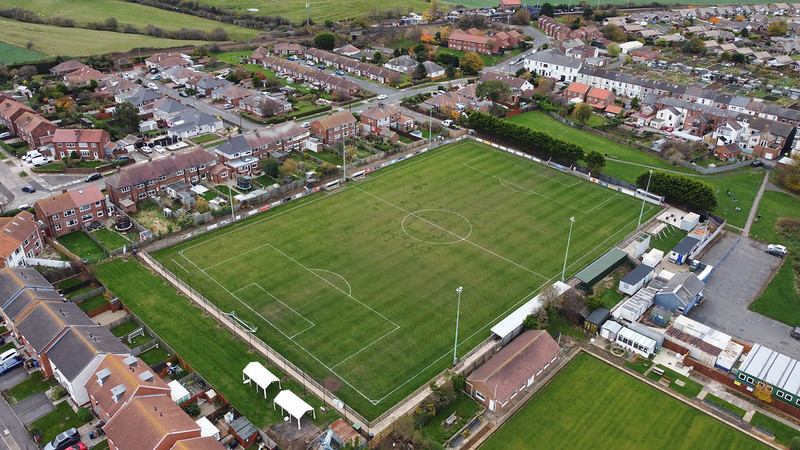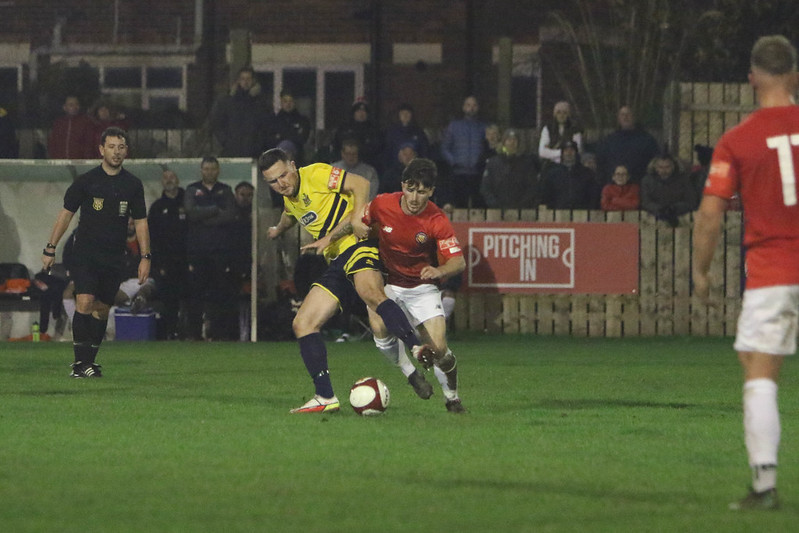
The recent withdrawal of Marske United from the Pitching In Northern Premier League provided a reminder of the dangers of football clubs living beyond their means and why adopting a more cautious approach that prioritises long-term sustainability is the way forward. Longstanding volunteer Jonathan Allsopp penned this piece on behalf of the club...
Like an unflushable Boxing Day turd, the European Super League surfaced again over the festive period. No surprise that a collection of billionaire football club owners should resist the bog-brush brandished at them by supporters in 2021 and persist in their plans to move the game to another level in terms of extracting the maximum possible value from their global brands.
It’s the logical next step in the annexation of top flight football by the super-rich over the last three decades that has resulted in some clubs becoming “richer than god” whilst scores of lower league clubs fight for survival. Since football was invented in 1992 there have been more than 60 instances of clubs going into administration in the top four divisions whilst further down the pyramid numerous clubs have gone bust.
Only last week there was good and bad news in the seventh tier as Marske United announced that whilst their recent fundraising efforts have ensured that the club will survive they have nevertheless decided to withdraw from the Northern Premier League Premier Division with immediate effect.
They had tried to raise £120,000 to see the first team through to the end of the season but instead the £26,000 raised so far and “significant contributions” from new directors will provide the club with a foundation from which to hopefully regain stability further down the football pyramid. But for at least the next few months the seaside village will be without first team football.
When knocking FC United out of the FA Trophy in consecutive seasons in 2020 and 2021 – whilst still in the division below – Marske looked, to the casual observer, like an upwardly mobile and well-run club with much to admire.
Rising costs
But in last week’s announcement of its decision to withdraw from the league the club acknowledged that whilst it had “punched above its weight for many years” resulting in a rapid rise through the leagues it had “unfortunately stretched itself too far and lived beyond its means”. The double whammy of rising costs and shrinking revenue streams caused by the present cost of greed crisis had snowballed into an existential threat for Marske.
The decision by Marske to resign from the league, whilst clearly in their best interests, has a direct financial impact on clubs across the league. We have been fortunate to be able to organise the friendly against Stalybridge Celtic on the day we were due to host Marske at Broadhurst Park. This will go some way towards mitigating the loss of the fixture, but we are unlikely to generate the same level of revenue that we would for a league fixture.
Bamber Bridge were not so lucky. They were due to host Marske on Saturday 6th January, just two days after Marske’s resignation, leaving them with no chance of being able to arrange an alternative. Obviously, we wish Marske well for the future, but nobody should underestimate the ripple effect of their decision and the impact on clubs like ours.
Over-stretch
Of course, they’re not the first Northern Premier League club to over-stretch themselves and, almost certainly, won’t be the last. Promotion chasing Worksop Town resigned from the Northern Premier League in similar circumstances in 2014 amidst a financial crisis precipitated by the club’s owner declaring that he would no longer carry on funding the club. They began the following season in the ninth tier of the pyramid and have subsequently worked their way back to the NPL.
And last Saturday’s opponents Ilkeston Town are a different club to the one that we played the last time we visited the New Manor Ground in 2014 when Che Adams scored a terrific solo goal in a 3-1 win for the hosts.
The new club was formed in 2017 and began life in the tenth tier after the town’s previous club, Ilkeston FC had gone bust. And neither was this earlier club the same one that we had played on our first visit to the Erewash valley in 2009 – Ilkeston FC had risen from the ashes of the old Ilkeston Town which had folded, as a Conference North club, in 2010 (keep up at the back please).

Win-at-all-costs
When many of us migrated from Old Trafford’s hostile takeover and sought asylum at FC United in 2005 most of us probably thought we’d be enjoying a purer form of the game free from the increasingly win-at-all-costs nature of big football – not quite ‘jumpers for goalposts’ but a chance to return football to the people.
But just like kids trying to be Messi and Ronaldo in the school playground, it feels like non-league football is increasingly trying to imitate big football with ‘Big Ex-League Teams’ like Notts County, Wrexham and Stockport desperate to return as quickly as possible to what they perceive as their rightful place in the Football League and the ‘fairytale’ successes of the likes of Salford City and Forest Green Rovers garnering media attention. Meanwhile everyone else is compelled to cling on to their coat tails in an often desperate attempt to remain competitive.
If Forest Green, essentially a village team, can make it to the Football League then why not Marske? Although the rise and fall of our old friends North Ferriby United, who folded in 2019 less than five years after winning the FA Trophy and reaching the National League offers a cautionary tale.
When a football club is forced to withdraw from their league or, worse, goes bust inevitably it’s the staff, volunteers and supporters who ultimately lose out. In the worst-case, people end up losing their jobs and the local community and businesses who are reliant on the club also suffer. And supporters are forced to endure an often lengthy period of uncertainty regarding their club’s future.
At FC United we reckon there’s an alternative to this tired old cycle of ‘boom and bust’ that instead prioritises the long-term future of the club and people over profit. And it’s an approach that clubs like the reborn North Ferriby FC, who began life in the Northern Counties East League in 2019, are also adopting. Football clubs that don’t have a wealthy owner prepared to bankroll a promotion push or pump money in when times are hard must adopt a more cautious approach that prioritises long-term sustainability.
Kieran Maguire, a lecturer in football finance at Liverpool University, reckons that supporter-owned football clubs typically end up “operating a more cautious financial strategy as fans don’t have the wealth to underwrite losses”.
Sustainable
And that’s certainly been the case at FC United since 2016 as careful financial stewardship has meant that we’ve been able to remain financially sustainable and also do our bit for our local community whilst weathering a global pandemic and the cost of greed crisis. Without a wealthy backer the club relies on the collective strength of more than two thousand co-owners - an increasingly unfashionable concept in these days of fawning over celebrities and ‘self-made’ millionaires.
When more than seven hundred of FC United’s co-owners participated in a survey in 2021 that asked where we’d like to see the club in five years’ time, the majority of fans not surprisingly, said they’d like to see us promoted. But providing an affordable and sustainable alternative to big football, a vibrant match day atmosphere and doing our bit for our local community were seen as important too.
Which chimes with the views of Exeter City chair, Nick Hawker, who in an interview in the Guardian last year, celebrating 20 years of fan ownership at the Devon club, reckoned that “if all you’re worried about is how you feel at five o’clock on a Saturday then you’re wasting a huge opportunity” and added that the success of a football club can also be measured in terms of “good financial performance, what you do in the community, how you treat your supporters…”
There are plenty of times we’ve been mard at 5pm on a Saturday afternoon over the last few seasons at FC but when you own, as well as support, a football club there’s a bigger picture to see beyond simply what happens on the pitch.
The focus of our business plan and vision, approved by us as co-owners, is on ensuring that we’re able to grow our football club sustainably through increased attendances and non-match day activities so that it’s around for generations to come.
‘Boom and bust’ isn’t for us. We’ve spent nearly two decades building and nurturing this thing of ours into something special – risking it being flushed down the toilet of football history isn’t an option.